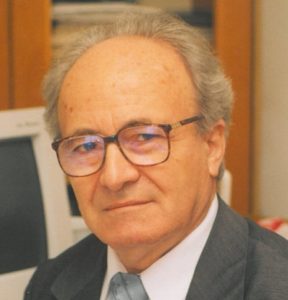László Mudra
He studied iron casting from the age of sixteen, then worked as an assistant at the MÁVAG Locomotive and Machine Factory. In the meantime, he completed evening technical school and then obtained a diploma in smelting engineering from the University of Heavy Industry (NME) in Miskolc.
From 1959 to 1991, until his retirement, he worked at the Danube Iron Works (DV). He was a roller operator, foreman, shift manager, senior technologist, head of production department, head of organization and computer technology department and factory director. In more detail: before the hot rolling mill was put into operation, in 1959-1960, he acquired his professional knowledge in Zaporozhye, Ukraine, and Nowa Huta, Poland. After that, from 1961-1963, he participated in the domestic training of the hot rolling mill roller operators of the Iron Works as an actual roller operator, foreman and shift manager.
When the Cold Rolling Mill of the Iron Works was launched in 1964, he was transferred to the Cold Rolling Mill as the leading technologist and also the deputy head of the factory unit. Here he was involved in developing and training the production technology of cold plate rolling, spirally welded pipe production, and then open and closed profiles from cold rolled plates.
Meanwhile, in preparation for the new economic management system at the time, he earned a degree in economic engineering from the Miskolc University of Applied Sciences in 1972, and then a doctoral degree from the University of Economics in 1974. In 1984, he also earned the scientific degree of Candidate of Economic Sciences.
In 1974, he was appointed Deputy Chief Production Engineer of DV, and later that year, Head of the vacant Organization and Computer Engineering Department. He also became the company delegate and then chairman of the Computer Engineering and Automation Section of the Ferrous Metallurgy Standing Committee of the Council for Mutual Economic Assistance (KGST).
From 1983 until his retirement in 2000, he was the project manager of the research and development production company ACÉLINFORM, founded by the Danube Iron Works and the Hungarian Academy of Sciences' Computer Science and Automation Research Institute (SZTAKI) (with Tibor Vámos and Gellért Répási on the board of directors).
After his retirement, he taught management, organization and entrepreneurship as a college professor at Dunaújváros College (DUF) for 20 years. He wrote a textbook on these topics entitled “Business consulting for managers, entrepreneurs and employees in the field of management, organization and entrepreneurship” (Dunataj Kiadó, 2000.) At the College, he was first the director of the Institute of Economics, then the Institute of Management and Entrepreneurship, and finally the chief advisor of the College.
His awards: three times excellent worker, excellent worker of metallurgy, excellent young engineer, excellent innovator gold degree, career award from the Veszprém Academic Committee (1980); Award for Dunaújváros College (2000); Award for Hungarian Higher Education; Pedagogical Career Award (Association of Hungarian Pedagogical Teachers in Slovakia, 2006).
- He carried Greek Catholic spirituality and a sense of Ruthenian identity with him throughout his life. At the time of the change of regime, he founded the Greek Catholic Cultural Foundation, and in 2004 he organized the Providence Greek Catholic Foundation.
- In 2010, he helped organize a Ruthenian minority self-government in Dunaújváros, of which he was the first president. He was also an elected representative of the National Ruthenian Self-Government.
Created: 2019.03.22. 21:47
Last modified: 2023.12.02. 12:30

